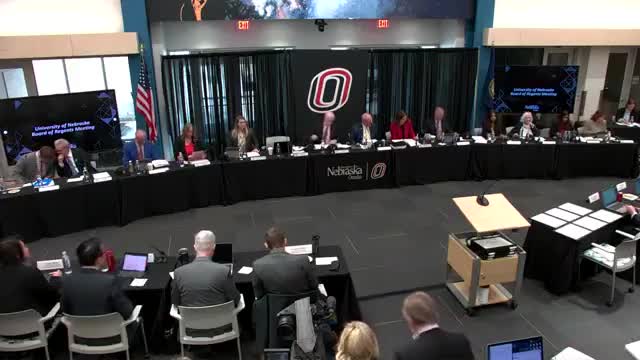Board actions at a glance: consent agenda, academic programs, contracts and construction approvals
Get AI-powered insights, summaries, and transcripts
Subscribe
Summary
The Board of Regents approved a broad consent agenda and multiple academic and capital items on April 11, including program approvals, collective‑bargaining amendments, construction change orders and naming of John Cook Arena. Most motions passed by roll call; specific items and outcomes are listed below.
The University of Nebraska Board of Regents on April 11 took a series of formal votes spanning academic program changes, collective‑bargaining agreements, construction and naming actions. The board approved the consent agenda and then considered multiple business and finance items. Key outcomes follow.
Academic and program items (Academic Affairs committee recommendations) - Establish Nebraska Children's Justice and Legal Advocacy Center (UNL College of Law) — Approved (agenda item 12.a.1). Board materials note private funds are in place to support the merger of two existing programs. - Establish undergraduate certificate in Irrigation and Agricultural Water Management (UNL) — Approved (12.a.2). The program targets online, non‑degree learners; no new resources required. - Eliminate Bachelor of Arts in Geology at UNL (retain BS option) — Approved (12.a.3). - Establish graduate certificate in Emergency Nurse Practitioner (UNMC College of Nursing) — Approved (12.a.4). The 16‑credit hybrid program aims to upskill family nurse practitioners serving rural emergency settings; program proponents said many participants will be clinicians already working in those communities.
Business & Finance and capital items (highlights) - Collective bargaining agreement amendments (UNK and UNO faculty units) for 2025–2027 biennium — Approved (12.b.1 and 12.b.10). Both agreements include multi‑year salary adjustments for eligible faculty. - Husker Vision enabling work change order (Memorial Stadium improvements) — Approved (12.b.2); donor/athletics funds used; no tuition/state funds required. - Naming: John Cook Arena at the Bob Devaney Sports Center — Approved (12.b.3); donor funded, includes a bronze statue and signage. - Outdoor track replacement change order (UNL) — Approved (12.b.4); enhanced spectator and technical upgrades added; funded within project contingency. - Pershing Military and Naval Sciences Building renovation budget increase ($685,300; ~6% of original budget for that project) — Approved (12.b.5); funds from existing UNL LB 384 allocation. - Westbrook Music Building amendments and change order ratification — Approved (12.b.6). - Project Health enabling work budget increase ($69,000,000) and Integrated Project Delivery Agreement — Approved (12.b.7 & 12.b.8); Project Health program budget reported at $2,191,000,000 and on schedule. - Core Building mechanical/electrical enhancements (UNMC core building) — Approved (12.b.9). - Biomechanics Research Building Phase 3 program statement and budget ($17.1 million; privately funded) — Approved (12.b.11). - UNO electrical switch relocation budget increase (from existing LB 384 funds) — Approved; requested increase $2,000,000 to total $6,000,000 (12.b.12).
Consent agenda and other routine items - The board approved the consent agenda (includes multiple personnel, purchasing and minor program items) by roll call vote (consent passed under agenda item noted at ~7194 on the transcript).
Roll‑call format and recordkeeping Many items carried unanimous or near‑unanimous roll‑call approvals; votes were recorded on the record for each item and are reflected in the board minutes. Several items noted abstentions or recorded no votes by specific regents during debate (for example, a single abstention on the Project Health IDR/IPD approval). Where the transcript recorded specific roll‑call “yes/no” responses, those are included in the official minutes available from the secretary to the board.
Why this matters: The actions advance new academic certificates and degrees, authorize capital construction and change orders, establish named facilities and move forward a large health‑care campus project. Several items are donor‑funded; others draw on LB 384 state allocations or internal contingencies. The approvals signal the board’s near‑term capital and academic priorities.
What’s next: Implementation steps include contract execution, project procurement, and campus rollout of new programs. Business & Finance and Academic Affairs committees will receive progress reports on major projects and program enrollments.
